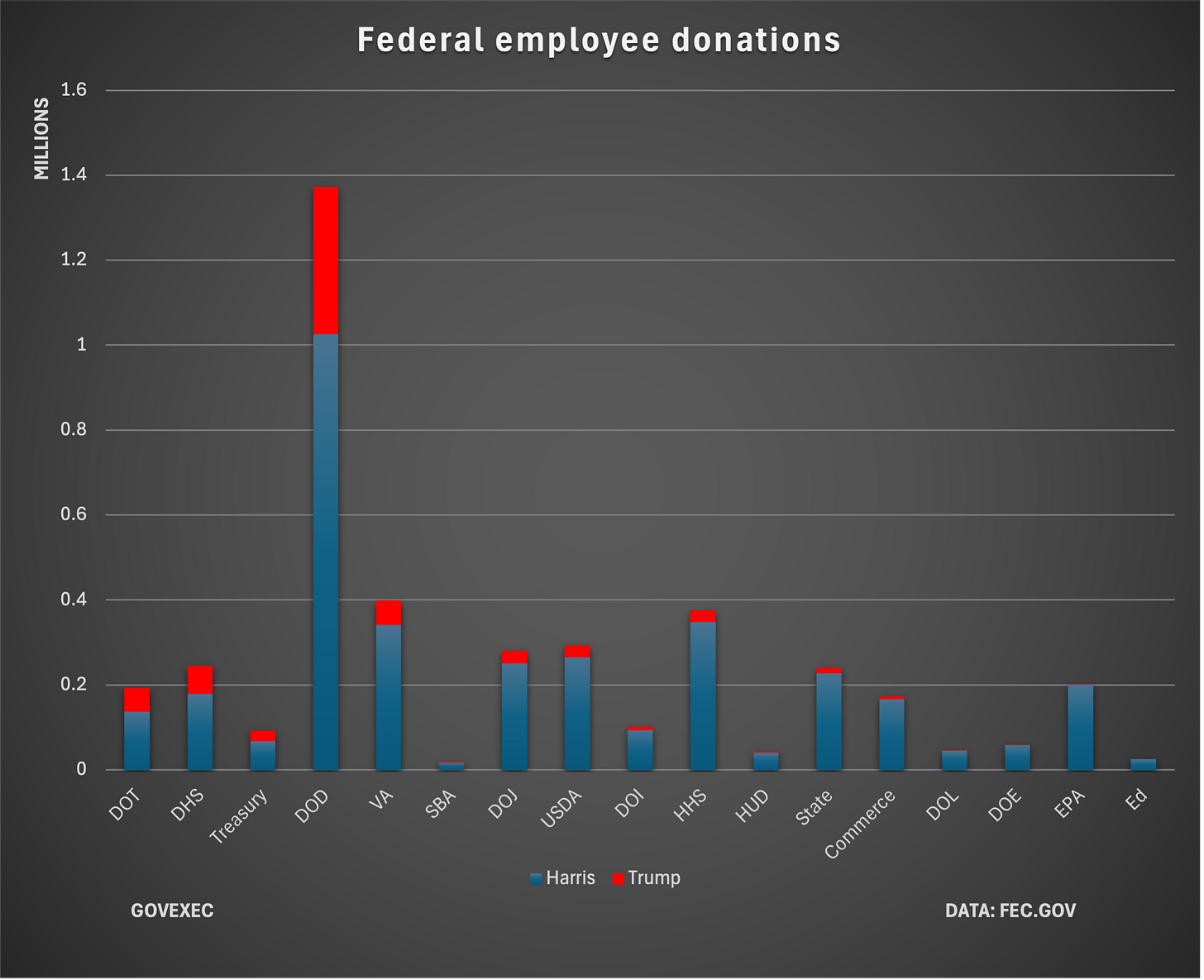Why Federal Workers Won’t Quit
Or, "Federal workers are grossly overpaid. I'll bet on it!"
Being a federal worker has suddenly gotten far less pleasant. Trump keeps erratically lashing out his entire workforce. He’s siccing Elon Musk on them in search of waste and heresy. He’s ordering them to abandon years of hard work.
Furthermore, in the eyes of most federal workers, Trump is ideologically and personally odious. While I couldn’t find any decent data on federal workers’ Democrat/Republican ratio, federal workers’ campaign contributions skew quite left. Indeed, setting aside the military, federal workers look almost monolithically Democratic:
Granted, you could argue that a few of Trump’s policies are making federal workers’ lives better. Firing all the DEI workers and ending all the DEI trainings will outrage the far left, but the moderate left will perchance breathe a quiet sigh of relief. But even the most moderate leftist probably hates Trump twice as much as they hate DEI, so on balance it’s safe to say that most federal workers’ job satisfaction is, on balance, taking a big hit.
Upshot: Lots of federal workers must currently be asking themselves, “How can I stand to work for this monster?” In a normal company, you’d expect many of these malcontents to jump ship — especially when the national unemployment rate is only 4%.
My prediction: Virtually all federal employees will keep working for the monster.
In recent years, the quit rate for federal workers has been about one-quarter the rate for workers in general. Deliberate buyouts aside, the quit rate for federal workers will remain rock bottom.
What makes me so confident that federal quit rates will remain low despite working conditions that most of them must find repugnant?
To understand my answer, you have to ask another question: Why were federal workers quit rates so low in the first place?
Simple: As the Congressional Budget Office confirmed years ago, federal workers are vastly overcompensated. True, the numbers on their paychecks are nothing special. But their measured benefits are sky-high, and their unmeasured benefits — especially ironclad job security (and its corollary, rampant shirking) — are similarly enviable.
Federal workers are understandably loathe to walk away from this deal, because it’s way better than most of them could get elsewhere. Indeed, the deal is so sweet that Trump would have to antagonize federal workers far more before they’d throw in the towel. The far-sighted can even console themselves with, “Sooner or later, the Democrats — or at least a traditional boring Republican — will be back in power, and my life can go back to normal.”
Prior to the Congressional Budget Report on federal workers’ compensation, at least one eminent economist continued to flatly deny that federal workers were overpaid. As far as I can tell, neither he nor any other skeptics bothered to dispute the CBO report. But if that report didn’t settle the issue for you, the past and future behavior of the federal worker quit rate should. If federal workers aren’t paid above market, why do they so rarely walk away when their working conditions sharply deteriorate?
To be fair, prudent quitting takes time. During the next year or so, federal workers’ quit rate could conceivably spike. I’m happy to bet that it won’t. Any takers?
P.S. A bet would have to carefully distinguish federal workers who accept a cash buyout from federal workers who actually quit. If you’re tempted to wager, we’ll figure out the details together.




My concern is that even if quitting doesn’t go up by much, we could still see a significant decline in workforce quality for a few reasons:
1) The best employees will be more likely to find equivalent or better jobs in private industry and thus the least “inertia” keeping them with the feds. Any increase in quitting will be biased towards the best employees.
2) Federal jobs will be less attractive to new hires. Getting someone into the job is harder than keeping them there, and more likely to be impacted by ideology.
3) Hiring and pay raises will probably be restricted by this administration, which may or may not ever be fully compensated for by a future admin.
4) Current DOGE cuts are very slash and burn - they aren’t really correcting the overpaid or shirking issues, just doing pretty indiscriminate layoffs (e.g. canning all probationary employees i.e. new hires somebody probably really really needed to be onboarded)
On the margin, this makes federal jobs less attractive which will affect people with options the most - and those tend to be the best employees (or at least the ones with the most in-demand skills).
"Loath" is an adjective, "loathe" is a verb.